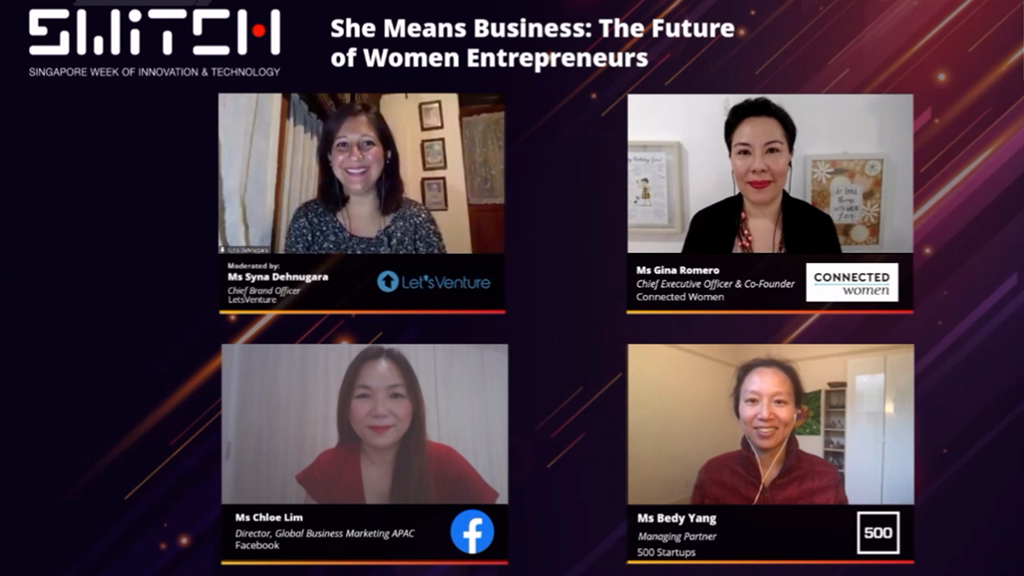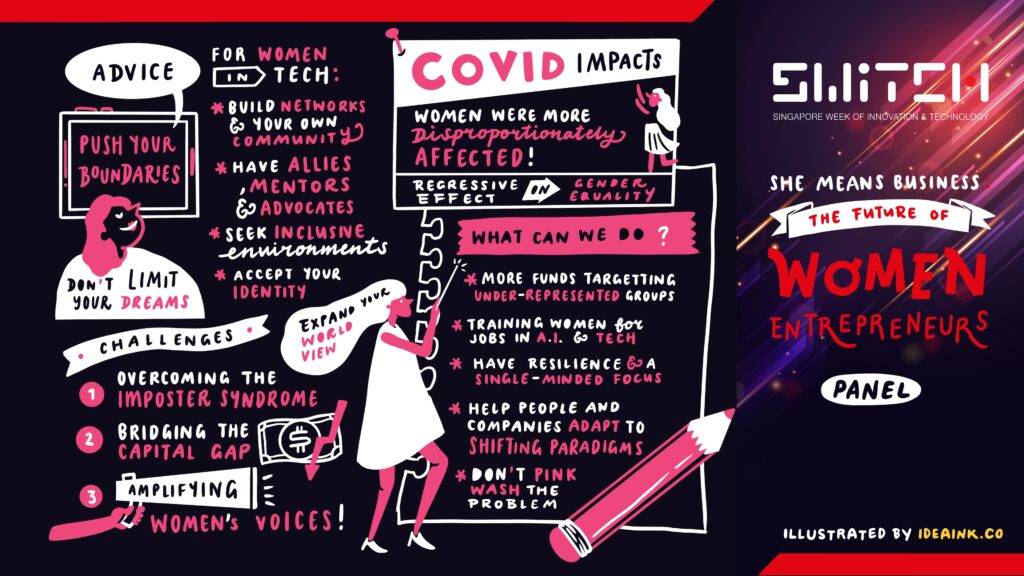SWITCH Congress Shows How Women Can Thrive In A Male-Dominated Industry
 Contributed by
Sasha Lim Uy Mariposa
December 10, 2020
Contributed by
Sasha Lim Uy Mariposa
December 10, 2020

“The pandemic has a regressive effect on gender equality.”
This is what Chloe Lim pronounced at the Singapore Week of Innovation and TeCHnology (SWITCH), the fifth annual congress where innovation meets enterprise, and start-ups, investors, and the in between are celebrated. From a record-breaking 60,000+ participants in 2019, this year, it went fully digital, hosting sessions with various innovators and power players.
Lim, director of APAC Marketing Group, Facebook, was one of the speakers for She Means Business: The Future of Women Entrepreneurs, which discussed how entrepreneurship, despite being a male-dominated field, empowered women to build themselves and their community up. Joining her on the panel were Bedy Yang, managing director of 500 Startups and Gina Romero, founder and CEO of Connected Women. Syna Dehnugara moderated. Dehnugara was a former features editor for CNBC-TV18 before becoming chief brand officer of investment start-up LetsVenture.
As the world continues to tally the casualties of the coronavirus, it is easy to overlook the collateral damage caused by the pandemic—economics, specifically the economics of women.
Women have been profoundly affected by the lockdown. In the past, women were hard-pressed to find work that offered flexible solutions that allowed them to balance the demands of their gender. Come 2020, a deadly virus had pushed companies to a corner, forcing them to finally face work-from-home resolutions. But juggling responsibilities only became heavier for women—with earning money, homeschooling, and managing the household.
Yang painted an even broader picture: Data has found that in 2019, companies founded strictly by males raised $195 billion. For companies founded by women, the number plummets to $6 billion; while those that were built by mixed genders raised $20 billion. With COVID, there has been an almost 50% drop in funding by companies ran by women.
Yang also cited a study by McKinsey & Company: Women make up 39 percent of global employment but account for 54 percent of overall job losses. “Women are shouldering a disproportionate burden,” she said.
But this is nothing new to women. It’s just a matter of fighting back and finding ways.
Building communities for women
How does a woman end up in a doubly masculine environment like tech and business? Or, more importantly, how does a woman thrive?
The shorthand answer, according to Yang, was networking. A Chinese-Brazilian living in the Bay Area, she realized early on that connections didn’t come naturally to her. She was, however, innately determined. She didn’t intend to get into venture capitalism, but, having helped indigenous communities in the Amazon, she stumbled into the industry in her desire to scale the impact of helping more entrepreneurs.
“I was trying to find the solution. How do we find the way to not only empower a small number of people, but tens of thousands of entrepreneurs in different parts of the world?” she explained. The answer was tech, which could bridge the gaps that were held by geography.
Within that network, the resolute Yang realized that she needed to be distinct. “How can I contribute with my own voice? How do I build on that?”
As for Romero, she saw the importance of networks and communities very early on. The daughter of a U.K.-based domestic worker, she had been flight crew for British Airways when she and her husband decided to jump into a small buy-and-sell Tech business. Neither knew much about the industry and she wound up attending a networking lunch for women. There, she met people who, like her, came from humble beginnings, but she also met others who had enriched resumes.
“In many ways, despite our different backgrounds, we were there for a common thread,” she recalled. “We wanted to learn how to start up a community…I’ve taken that thread to everything that I’ve done.”
The pandemic, of course, disrupted this order.
“[It’s] one of the biggest challenges during COVID. You used to be able to meet new investors, but with the distance now, it’s even harder,” said Yang. “We built this global hub for female founders to build these connecting tissues between the entrepreneurs, mentors, and investors.” She also emphasized the need to create additional resources for female founders and to amplify the voices that have already been heard.
Romero, for her part, has already developed her own community with Connected Women, whose origins began when she, as a little girl in the U.K., saw families ripped apart by the need for employment. Not only has Connected Women answered women’s call for location-independent occupations, helping them access income that they can earn from home—a matter that is imperative these days—it also prepares women for the future by training them in fields in AI.
The importance of support
But a good network is more than a means to stabilize business. It’s also a venue for support, especially during these troubled times.
Despite tech’s reputation for being a largely male enterprise, Lim discovered she thrived there. Through tech, a woman with no travel records, not even a passport, was able to see the world. An internet startup sent Lim to Hong Kong some 20 years ago. Later, she would move to Australia to run an online travel agency.
“You need to stick in environments, in places where you can flourish. [Tech has made me] feel empowered and I can do my best job. It’s fast-paced, pretty empowering, with lots of problems to be solved and I don’t mind ambiguity,” she said, adding that she has been fortunate in working in companies that stress on diversity and inclusion.
Yang keeps things real. She reveals that she looks up to Christine Tsai, CEO and founder of 500 Startups and wondered how she was able to do it all—be an acclaimed businesswoman as well as a mother. Tsai’s response to her was breathtakingly honest: “I’m not balancing it. I’m just trying to survive on both.”
“I find that very inspiring because I was brought up in a very business male success-like framework so if I need to success, I need to look like them,” Yang said, adding that her boss showed her how empathy could change and affect what we do.
Romero’s first level of support came from her husband, who, even during their earlier Tech buy-and-sell days, gave up his job to focus on the business. It’s a story that would repeat itself years later when they returned to the Philippines in 2016.
“I’ve been working with women entrepreneurs all over the world, empowering them through tech, maybe it’s time that we went back to the Philippines,” she told her husband in 2016. “That was on a Wednesday and by Friday, he quit his job. Within a couple of months, we were back [in the Philippines].”
It’s a kind of support that’s all the more crucial during this day and age. “How do you keep your spirits up during the pandemic?” Lim asked.
Every time she thinks about this question now, amid COVID, she goes back to the time when her online travel agency experienced a series of catastrophes around the world that deterred tourism—from bombings to tsunamis. Despite the setback, she and her team had the single-minded focus to bounce back.
“Everybody was there with a real showcase of resilience,” she recalled. “Having a great team around to really motivate support and inspire each other…We were just keeping each other going. It’s something I still lean into during this time.”
But the pandemic, Lim believes, will birth innovation. “Very frequently, when there is a disaster, you start to come up with lots of ideas for a very good purpose,” she said, describing how, back then after the collapse of the tourism industry, they had to change business focus and offer a much broader set of markets and products to attract the traveling set. Everyone worked long hours and even executives were answering phones and performing customer service. In the end, they were back on an upward trend in a year’s time.
There’s no doubt that the pivots brought on by the coronavirus will set the trend for technology in the near future. And with these women at the helm, the future is in safe hands.

Illustrated session summary courtesy of SWITCH SG: notes.switchsg.org/notes/131
SWITCH is organized by Enterprise Singapore (ESG) and Intellectual Property Intermediary (IPI), supported by National Research Foundation (NRF), and in partnership with SingEx. #ConnectedWomen are proud media partners of SFF x SWITCH

We are #ConnectedWomen. Join us now and be part of a global community of women entrepreneurs, freelancers & professionals.










Sorry, the comment form is closed at this time.